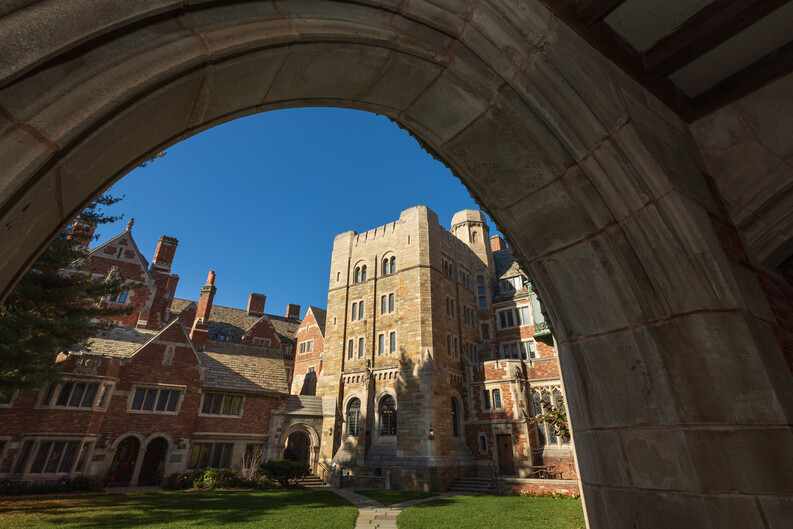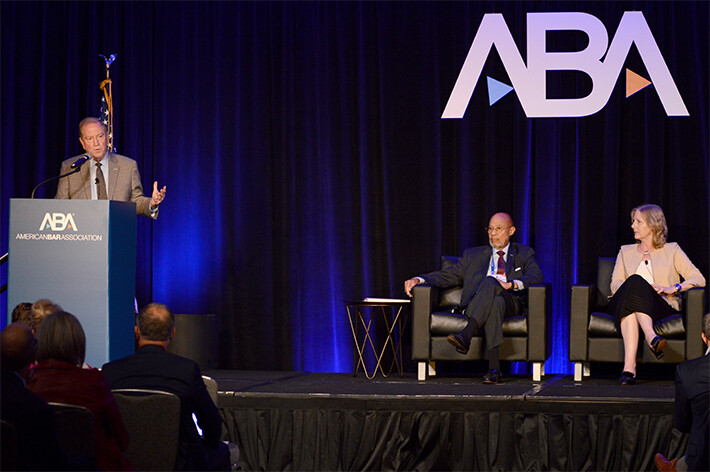Dean Heather K. Gerken Speaks at ABA Democracy Summit

Dean and Sol & Lillian Goldman Professor of Law Heather K. Gerken gave remarks at the American Bar Association’s annual conference in Chicago on Aug. 2 during a panel4 titled “Role of Lawyers and the Justice System in Defending the Constitution and Assuring Trust in Elections.”
In the speech, Gerken outlined how legal educators’ enduring commitment to the rule of law has sparked a renewed focus on the best traditions of lawyering — engaging across divides, professionalism, integrity, and mutual respect — in a moment of rapid change and intense polarization.
“There is an extraordinarily important conversation taking place about how we teach our students legal ethics and, just as importantly, ethics writ large,” she said. “But when it comes to educating the next generation of lawyers, as important as all of these new conversations are, now is also the time to breathe life into our best traditions. We are members of an honorable profession, with shared values and shared obligations in a community.”

Gerken is a member of the Task Force for American Democracy5, a bipartisan group of experts in law, public administration, and politics that works to improve public trust in the election system and support the rule of law. According to the Task Force’s first analysis6, released during the Aug. 2 event, democracy in the United States faces a wide range of serious threats — and lawyers play a critical role in countering them. The Task Force is co-chaired by former federal Judge J. Michael Luttig and former Secretary of Homeland Security Jeh Johnson.
Both Judge Luttig and Secretary Johnson visited Yale Law School last year for events hosted by the Crossing Divides Program7, a speaker series bringing together high-profile leaders from opposite sides of national debates to discuss how they bridge differences and work to understand one another.
I always tell my students that we don’t just expect them to have conversations across divides, but friendships across divides.”
—Dean Heather K. Gerken
The program is an example of new initiatives offered at law schools around the country that underscore the importance of ethics and the rule of law. Yale Law School, Gerken said, has worked to boost professional training and saturate the School with important discussions about the values of lawyering, through coursework and special programming from The Tsai Leadership Program8 and the Crossing Divides Program, among other initiatives. Gerken also spoke about how the Law School has worked to more than triple the number of veterans9 on campus and how their unique perspectives informed by selfless dedication to the ideals of the country greatly enhance the community. “[Veterans] know better than anyone else how to work across differences,” said Gerken.
In June, Gerken worked with other members of the Task Force to publish a letter signed by more than 100 deans10 that highlighted the role of law schools in supporting constitutional democracy and reinforced a commitment to teaching students to disagree respectfully and to engage across ideological divides.
Law schools have always done this work, Gerken said, but in a hyperpolarized world, legal educators have to do much more. “In the past, that training — combined with the magic that comes from putting people from radically different places and having them live and learn under the same roof — that used to be enough. But it is no longer,” she said.
“The reason deans across the country are redoubling their efforts to teach the fundamentals is that the everyday habits of lawyers are precisely the habits of citizenship that we all need to acquire. The hard work of lawyering requires humility and a relentless willingness to question yourself. You cannot be a lawyer if you equate everything you care about with the law. You cannot be a lawyer unless you can understand — deep in your bones — what’s honorable in your opponent’s commitments and the weaknesses in your own. I always tell my students that we don’t just expect them to have conversations across divides, but friendships across divides. To be a lawyer means to have habits of mind and habits of community.”
Gerken concluded with a hopeful note about the positive engagement she is seeing from the next generation of lawyers, even in challenging times.
“What gives me hope is that our students are learning despite the headwinds of this moment. They are learning to be great lawyers and thus to be great citizens.”


